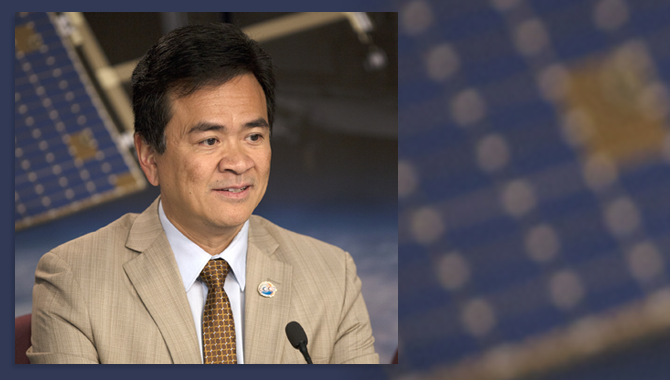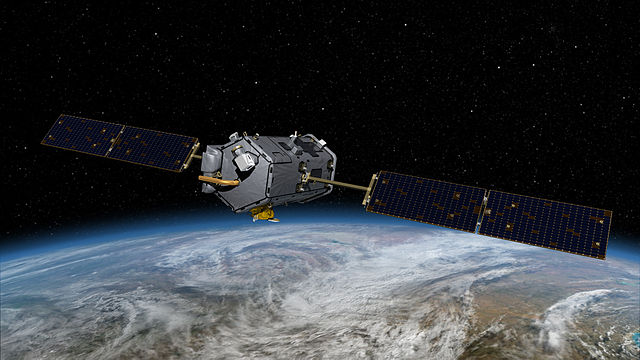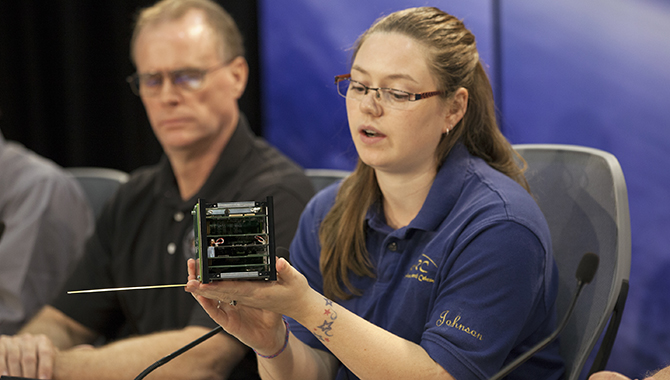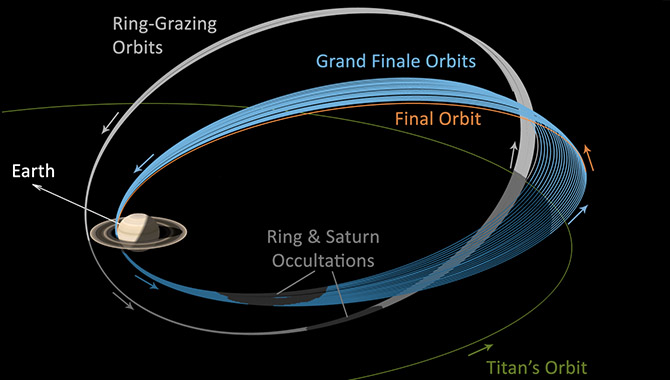
OCO-2 project manager Ralph Basilio discussing the successful launch of OCO-2 on July 2, 2014.
Photo Credit: NASA / Kim Shiflett
Gaining experience, finding mentors, and even making mistakes are important elements in becoming an effective project manager.
Regardless of the size of the project, a project manager must understand every aspect: its goals, requirements, challenges, and risks. His or her responsibilities run the gamut from addressing technical, cost, and schedule risks to managing the personalities on the team. Most of all, making tough decisions is a daily job requirement. How can an early-career engineer work toward developing the skills to master a job of this magnitude?
APPEL News had the opportunity to ask Orbiting Carbon Observatory-2 (OCO-2) Project Manager Ralph Basilio a few quick questions about what he did—and still does—to maximize his ability to be an effective project manager. Basilio certainly doesn’t underestimate the value of a good education: he has a PhD in aerospace engineering from University of Southern California and is a graduate of the Engineering Management Program at the California Institute of Technology. But the bottom line, he stressed, is that aspiring project managers need more than university programs can provide.
APPEL News: Thanks for taking a few moments to share some of your wisdom with aspiring project managers. You obviously believe in the importance of a good education in laying the framework for a career at NASA. Would you say engineers can learn how to be effective project managers at school?
Ralph Basilio: We spend a great deal of time on our formal education…but there are some things that you really can’t train for in school. It’s up to the individual project manager to go out there and get the training he or she needs in order to make the sometimes very difficult decisions we have to make. Very few things are black and white. For example, as a rule I can say: drive decisions down to the lowest level. But you can’t always do that. You need the experience to know what to do when. You don’t learn that in class.
APPEL News: Where does the ability to make difficult decisions come from, if not the classroom?
Basilio: As a project manager, I have to be willing to overturn a recommendation or decision if I think it’s not appropriate. But that’s not something they taught me how to do in school—it’s based on good engineering judgment. How do you get good engineering judgment? From experience. Where does the experience come from? Bad engineering judgment—mistakes you made before that gave you scars. That experience helps you develop the capacity to make sound decisions. You have to make a lot of decisions based on little information. That’s the toughest part of this job, but I wouldn’t have it any other way.
APPEL News: That relationship between good judgment and bad judgment is an interesting one. Is that something you learned from experience?
Basilio: The notion that “good decisions come from experience, and experience comes from bad decisions” is something that I saw many years ago in the office of my boss and it has stuck with me. I’m a firm believer that one can learn from both good and bad experiences. However, just like in school, there is more that can be learned when things don’t go quite the way they were intended or expected. To me, these just are valuable opportunities to increase the probability of making the right decisions in the future.
APPEL News: When it comes to making hard decisions, is the project manager all alone? Or do others help?
Basilio: In the end, the project manager has to make the decisions. But I think it would be a mistake not to be surrounded by a group of advisors. You can’t do it on your own. I don’t have to solve all the problems on my own. Maybe I’m just a humble guy, but I don’t really care [where the solution comes from] as long as we improve the odds of mission success…My nature is to deliver on my promise, do my best, and hopefully everybody else will do their best, too, to achieve our common goal.
APPEL News: Is there anything else that can help engineers evolve into effective project managers?
Basilio: Having a good mentor. I’ve had two outstanding mentors. One is Tom Livermore, who was my Project Manager on OCO [the original Orbiting Carbon Observatory]. He’s retired but is still my mentor. I meet with him every couple of weeks. I tell him how things are going, talk about how I might improve this thing or that thing. My other mentor is my former Deputy Director for [the] Earth Science [Technology Directorate]. I see him about once a month. How could I not avail myself of their 40-plus years of experience working in the aerospace industry? And how could I not heed their advice? They’ve been nothing but a great wealth of information. So I would recommend that every project manager should have at least one mentor.
Before becoming the Project Manager for OCO-2, Basilio was the Deputy Project Manager of OCO and also served as the Deputy Project Manager of the Ocean Surface Topography Mission (OSTM). OCO-2 is an Earth System Science Pathfinder project run by the Jet Propulsion Laboratory (JPL) that employs high-resolution thermal telescopic instruments to provide extremely detailed information about the global distribution of CO2, a greenhouse gas implicated in the changing planet climate.
Learn more about the OCO-2 mission.
Read a previous APPEL News interview with OCO-2 Project Manager Ralph Basilio.









